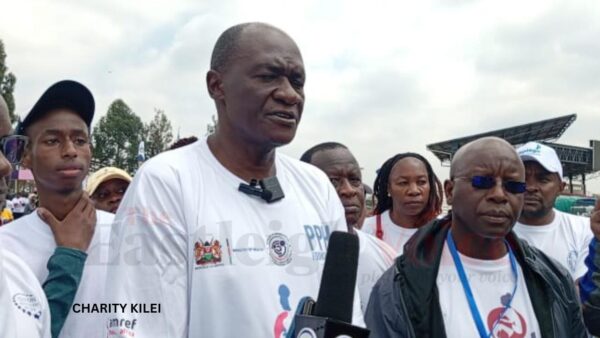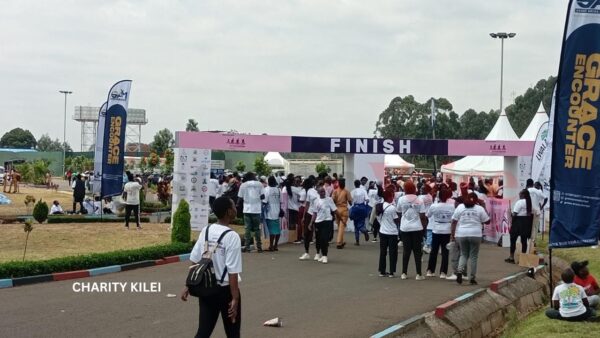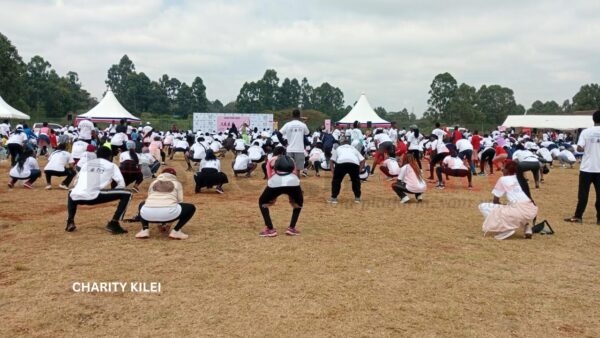Over 6,000 Kenyans join global run in Nairobi to raise awareness on maternal deaths
Globally, an estimated 260,000 women die annually from childbirth-related complications. Of these, around 70,000 deaths are due to postpartum haemorrhage.
More than 6,000 Kenyans, including children and adults, gathered at the Ulinzi Sports Complex in Nairobi on Sunday to take part in a run dedicated to raising awareness about postpartum haemorrhage (PPH), one of the leading causes of maternal deaths in Kenya and around the world.
The event marked the climax of a global campaign and highlighted the urgent need for action to protect mothers and newborns during childbirth.
More To Read
- Africa’s hidden stillbirth crisis: New report exposes major policy and data gaps
- Review meeting highlights barriers to immunisation, maternal health in Turkana
- Kenya’s maternal mortality ‘a crisis that cannot be ignored’, MP Nyikal warns
- Postpartum haemorrhage: How Kenya’s Roaming Blood Bank initiative is saving mothers' lives
- Governors decry Health Ministry’s move to deny maternity funds to dispensaries
- Ministry of Health announces measures to reduce maternal, newborn deaths
This run was part of the Second Global PPH awareness run, held simultaneously in more than six countries, including Uganda, Tanzania, and Zambia.
In Kenya, counties such as Kakamega, Mombasa, Kajiado, and Homa Bay also hosted similar events, each drawing hundreds of participants committed to raising their voices for maternal health. The event served as a rallying point for health professionals, community leaders, civil society groups, policymakers, and ordinary citizens — all united under a common purpose: to end preventable maternal deaths
Dr Patrick Amoth, Director General of Health, while participating in the described maternal mortality as a solvable crisis that continues to rob families of mothers due to systemic failures.
"Mothers are not dying because we don't know what is killing them. They are dying because we have not come together — as a health system, as a society, and as policymakers — to ensure that no mother dies while giving life," he said.
Dr Amoth stressed the importance of health financing as a transformative agenda. He noted that the government is already working on policies to support mothers who cannot afford to pay for maternity services, including those without national identification documents. The Ministry of Health has developed platforms to ensure that teenage mothers, regardless of whether they possess documentation, are not turned away from hospitals.
He reassured the public that funding is available to cover the costs for these vulnerable mothers, but emphasised the need for greater collaboration between counties, the national government, and civil society to make this a reality across the country.
 Dr Patrick Amoth, Director General of Health, speaks to the media during an event to mark the Second Global Postpartum Haemorrhage run in Nairobi on September 28, 2025. (Photo: Charity Kilei)
Dr Patrick Amoth, Director General of Health, speaks to the media during an event to mark the Second Global Postpartum Haemorrhage run in Nairobi on September 28, 2025. (Photo: Charity Kilei)
Dr Amoth also called on Kenyans to embrace a culture of voluntary blood donation, stressing that there is no substitute for blood in cases of emergency.
"There is no replacement for blood. Every time you donate, you could be saving a mother's life. We are working to build a blood ecosystem where every county has its own transfusion centre to ensure a timely and sufficient blood supply," he said.
The government is rolling out a national strategy to change public attitudes toward blood donation, especially targeting youth and communities with low participation rates.
At the heart of the campaign lies a grim truth: women are still dying needlessly during childbirth, often from entirely preventable causes.
Prof. Moses Obimbo, a gynaecologist and obstetrician from the University of Nairobi, highlighted the staggering statistics surrounding maternal health in sub-Saharan Africa.
Globally, an estimated 260,000 women die annually from childbirth-related complications. Of these, around 70,000 deaths are due to postpartum haemorrhage, with approximately 6,000 occurring in Kenya alone. These numbers are not just statistics — they are mothers, daughters, sisters, and wives who might have survived if given timely, adequate care.
 Participants during an event to mark the Second Global Postpartum Haemorrhage run in Nairobi on September 28, 2025. (Photo: Charity Kilei)
Participants during an event to mark the Second Global Postpartum Haemorrhage run in Nairobi on September 28, 2025. (Photo: Charity Kilei)
Prof. Obimbo also spoke about the dire shortages within Kenya's healthcare system. He noted that while the country trains many doctors, the system lacks the capacity to absorb them, especially in rural and underserved areas. This contributes to inequality in access to healthcare, where some women receive quality care while others suffer due to a lack of staff, equipment, or drugs.
Kenya currently produces about 200,000 units of blood per year, yet the recommended target is 500,000 units. Around 60 per cent of this limited blood supply goes toward maternal care. The shortfall leaves many women at risk, particularly those experiencing haemorrhaging during or after delivery. Prof. Obimbo noted that the country's doctor-to-patient ratio is 1:1000, while the World Health Organisation recommends a ratio of 1:440. This gap leaves healthcare workers overstretched and patients underserved.
"We have a good training system, but the challenge lies in implementation. We need reskilling programmes, more investment in infrastructure, and above all, adequate supplies of blood. Without that, we are letting our mothers down," Prof. Obimbo said.
One of the most encouraging stories shared during the event came from Jhpiego, an organisation dedicated to transforming maternal health outcomes in low-resource settings. The organisation has partnered with counties and the Ministry of Health to pilot innovative solutions aimed at reducing maternal deaths, particularly in rural areas.
A key initiative implemented in Makueni County involved introducing heat-stable cabetocin and the e-motive bundle, a clinical protocol designed to manage and reduce postpartum bleeding. The results have been remarkable. In 2022, the county recorded 12 maternal deaths. In 2023 and 2024, that number dropped to zero and in 2025, only two deaths have been reported so far.
"These are the kinds of localised solutions that can save lives," Michael Muthama, project director, Accelerating Measurable Progress and Leveraging Investments for Postpartum Haemorrhage Impact (AMPLI-PPHI), said in Makueni.
"We have the tools. What we need now is the will, the resources, and the community engagement to scale them across the country."
 Participants during an event to mark the Second Global Postpartum Haemorrhage run in Nairobi on September 28, 2025. (Photo: Charity Kilei)
Participants during an event to mark the Second Global Postpartum Haemorrhage run in Nairobi on September 28, 2025. (Photo: Charity Kilei)
Lawrence Omondi, founder of the Machozi Ya Mwisho Initiative, spoke about the plight of mothers detained in hospitals due to unpaid maternity bills.
"It is deeply disturbing that in 2025, women are still being detained after giving birth simply because they cannot afford the cost of delivery," Omondi stated.
He shared heart-wrenching stories of mothers whose babies became ill while in detention, and others who expressed reluctance to ever become pregnant again due to the trauma they endured.
"No woman should be punished for giving life. Maternal health should be free, and our systems must protect, not punish, the most vulnerable among us," he added.
Omondi urged the government to fully reinstate and fund programmes like Linda Mama, which previously allowed women to deliver for free under the National Hospital Insurance Fund (NHIF). With proper funding, infrastructure, and commitment, he believes every mother can receive the care they deserve — without fear of detention or neglect
As participants crossed the finish line at Ulinzi Sports Complex and across other counties, they did more than complete a race — they took a stand for every mother in Kenya and beyond. With over 60 per cent of women experiencing bleeding during childbirth, the need for education, awareness, and reform is urgent.
"We are running for our women, our mothers, our future. This is not just about a race — it's about waking up as a nation and saying: enough is enough. No woman should die while giving birth. Not now. Not ever," said one participant.
Top Stories Today















































